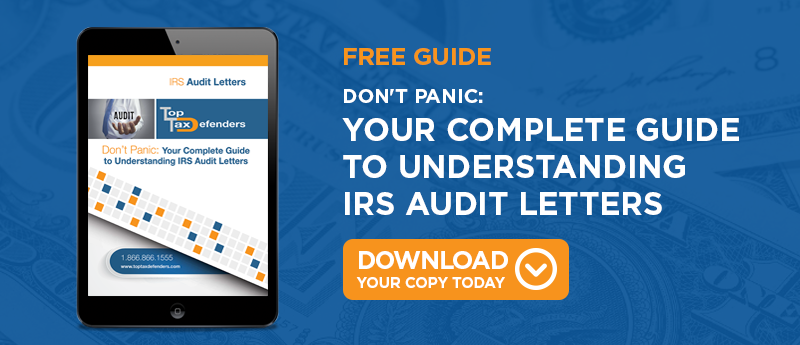
When much of your livelihood is wrapped up in your small business, you may dread ever being contacted by the IRS about missing returns or a tax debt. Nonetheless, the IRS will contact your business if you do in fact owe the government money. Your first instinct may be to ignore these communication attempts in a bid to protect your business. However, doing so only will make the matter worse and even put you in a more suspicious light. Rather than draw the ire of this agency, you can remain proactive and use these strategies to resolve your tax delinquency.
DECIDING WHICH TAX DEDUCTIONS TO USE?
DOWNLOAD OUR FREE, ULTIMATE LIST OF TAX DEDUCTIONS »
Maintain Contact
Taking this first step and keeping in contact with the IRS shows that you are aware of your obligation and want to address it head on rather than ignore it altogether. You can send letters, emails or call the toll-free customer service line to keep the agency informed about your financial circumstances, your plans to pay the debt and any circumstances that could delay your payment.
You should keep a record of these communications and include the date and the subject that each one discussed. This record could be useful if you ever must appear at a hearing with the IRS to negotiate your tax debt.
Provide Current Financial Information
It is important that the government knows about your business's finances, especially if the amount of money that comes in each month fluctuates greatly. You should provide current financial information to the IRS so that the agent assigned to your case understands why you can or cannot pay on your tax debt. This information can come in the form of bank deposit statements, profit and loss statements and accounts receivable records.
Request a Payment Plan or a Reduction
If you cannot pay the entire amount in whole, you should ask to be set up on an installment payment plan. This request should be in writing and include the ideal amount that you can pay regularly, as well as the date on which you can send that payment.
You could also ask for a discount of your tax debt. If you know that it will be some time before you can pay the amount in entirety, it would not be unreasonable to ask for a certain percentage to be deducted from that sum. In some cases, your agent may work with you and reduce the debt to make it more affordable for you.
File an Offer to Compromise
Similar to asking for a reduction, you can also file an offer to compromise. This offer acknowledges that you cannot pay the entire amount, but would still like to make amends by offering a smaller, yet still significant payment on this obligation. Again, this request should be in writing. If you are facing extraordinary circumstances like a serious illness or dire financial duress, you could be granted this offer to compromise.
File for Bankruptcy
Bankruptcy is usually a last resort to get away from the stress and pressure of an IRS debt. You may have heard before that taxes cannot be dismissed in a bankruptcy. Even if that is true to a degree, owed taxes, especially small business taxes, can be reorganized and included in a repayment plan under a Chapter 13 filing. You would still suffer the credit ramifications from filing for bankruptcy; however, it would give you the chance to pay off your tax debt if you have no other way of meeting this obligation.
DO YOU NEED IRS TAX HELP? SCHEDULE A FREE CONSULTATION WITH OUR TAX EXPERTS »
Hire a Tax Attorney
Negotiating with the IRS does in fact take quite a bit of effort and concentration. If you would rather focus on running your small business instead of dealing with this agency, you should hire a tax attorney to represent you.
Your attorney can act as a communication liaison and advocate to resolve this obligation. Your lawyer can also request that you be set up on payment plan, file for an extension on your behalf, and make an offer to compromise. You will be kept informed on the proceedings and still be able to run your business, all the while knowing that your lawyer is advocating for your best interests.
The success and future of your small business can be in jeopardy when you owe the IRS money. When you want to take care of this debt head on, you can be proactive and remain in charge of this resolution process by taking these important steps after your small business has been contacted by this government agency.


